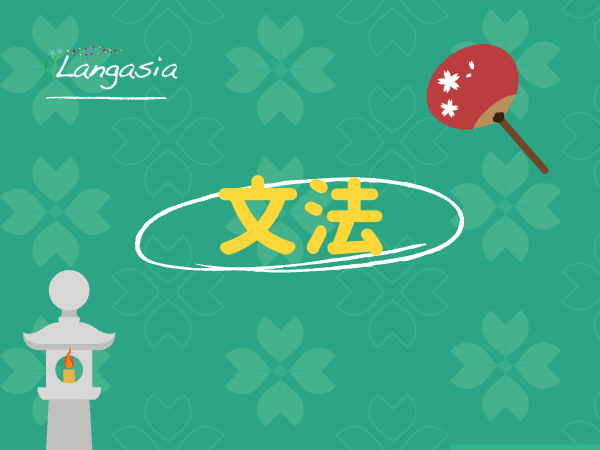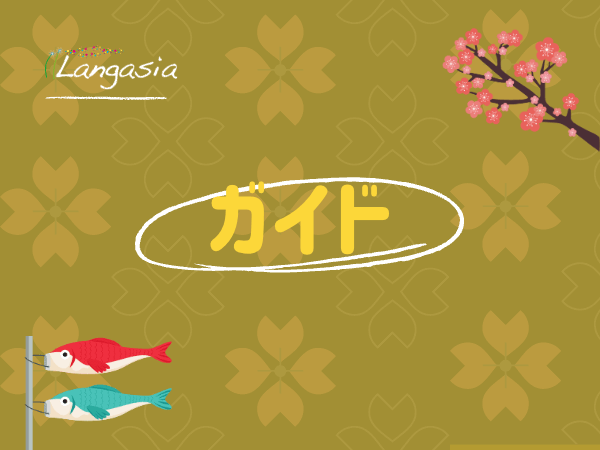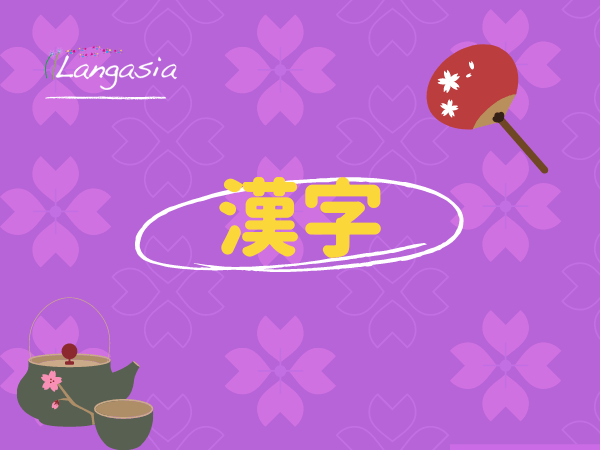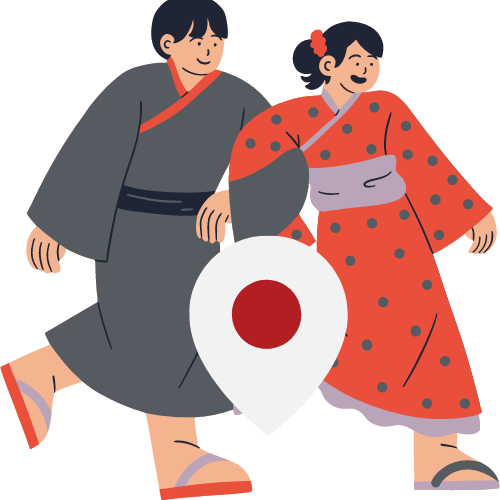
Beginner
15 modules
✽
359 Lessons
Now that you have learned the basics of the Japanese language, we will move on to more interesting topics. In this A1 level course, we will learn the essential gramm...
Course curriculum
1/ あいさつ Greetings
28 Lessons
In this module, you will learn the basic expressions commonly used in Japanese. We will also cover some basic sentences. At this stage of learning, the explanations of the sentences will be simplified, as they will be explained little by little later in the following modules. We will also learn our first kanji (Chinese characters). Let's see how to say expressions like "hello, thank you, sorry..." in Japanese. Let's get started!
2/ です・ある・いる To have, to be
20 Lessons
In this module, we will learn how to express the most common verbs which are “être” and “avoir” in Japanese. We will go through the few ways to express this in Japanese so that you can better understand how the Japanese language works. By the end of this module, you will be able to easily express être and avoir in Japanese.
3/ にんしょうだいめいし Pronouns
10 Lessons
In this module we will see how to designate ourselves and designate people. We will see that in Japanese, this is really different from English. We are going to see the different basic and common ways to express words like "I", "you", "we" etc.
4/ じこしょうかい Introduce yourself
15 Lessons
In this module, we will learn how to ask and say someone's name, nationality, and respond affirmatively and negatively. We will also see how to say nice to meet you and pleased to meet you. By the end of this module, you will be able to easily introduce yourself in Japanese as well as ask (and say) someone's nationality and occupation.
5/ こ・そ・あ This, that
22 Lessons
In this module, we will learn the different words to indicate the spatial position of an object or a person. In Japanese, the place of the object is a factor that will determine which word we will use to designate it. Throughout this module, you will learn these different words to be able to ask a question and answer it. At the end of this module, you will be able to use these different words to talk about objects or people near or far from you.
6/ しつもんする Ask a question
20 Lessons
In this module, you will be able to learn the most common Japanese question words. You will be able to learn the 5 basic question words. In fact, you have already learned some of them. In this module, we will review those already learned to be able to use them better as well as new ones. After this module, you will be able to ask simple questions and answer them with the most common question words.
7/ いち Locations
16 Lessons
In this module, we'll look at common words used to locate a person, a thing or an object. There are quite a few position words in Japanese, so we'll also be learning some useful grammar for constructing sentences and a number of new words. After this module, you'll be able to easily indicate the position of an object, thing or person, and also ask for the position of a person, thing or object.
8/ かぞく Family
22 Lessons
In this module, we're going to learn the different words used to talk about the family. Family in Japanese is a bit more complicated than in English. For example, the words may vary depending on whether you're talking about your sibling or someone else's. Unlike in English, we can also use certain words with strangers to challenge them. We'll look at the most common ones in this course and help you to use them correctly. After this module, you will know the basic words for introducing your family and talking about someone's family.
9/ すうじ Numbers
20 Lessons
In this module, we'll introduce you to Japanese numbers and how to use them. We'll look at the basic numbers as well as the higher numbers so that you can ask for or understand the price or even a telephone number. By the end of this module, you'll be able to count in Japanese.
10/ じかんひょうげん Expressions of time
36 Lessons
In this module, we'll look at expressions of time. You'll be able to morning, evening, today, yesterday, etc. We'll also how to ask the date, say the days and months. It sounds like a lot a lot of material, but once you know the numbers, you'll see that telling the date is really easy. that saying the date is really easy. We'll also learn how to construct the past form. By the end of this module, you'll be able to express the date, use expressions of time and speak in the past tense. in the past tense.
11/ ばしょ Places
30 Lessons
In this module, we will learn how to talk about places, how to ask for directions and how to respond. We will see how to ask for something politely, how to formulate accompaniment and how to express consequential actions. We will also learn how to warn someone about something as well as permission in Japanese. We will also learn how to talk about an action that happened before another action. By the end of this module, you will be able to express these various points with ease.
12/ ようび Days of the week
28 Lessons
In this module, we will learn the days of the week and how to use them in sentences. We will also learn more words that express time, but also how to express purpose. We will also learn how to express suggestion as well as how to make a proposition. By the end of this module, you will be able to express suggestion, purpose, and proposition in Japanese. You will also learn new words to express time.
13/ じかん Time
28 Lessons
In this module, we'll look at the time in Japanese. We'll also learn about excess and how to ask questions more naturally. This will give us a better understanding of how to use them, the words and the grammar. We'll also learn how to express the length of time from point A to point B. By the end of this module, you'll know new grammar points and be able to express yourself about the time in Japanese.
14/ しゅうまつ Weekend
34 Lessons
In this module, we'll be learning a little about how to communicate in everyday situations using words that are everyday expressions. We'll also look at how to ask for a wish, a desire, as well as comparison and the superlative. We'll learn more about the use of adjectives in the Japanese language. By the end of this module, you'll be able to explain the reason for something, talk about your desires/wishes and talk about everyday life too.
15/ にちじょう Everyday life
30 Lessons
Let's talk about everyday things. In this module, we'll learn various words and sentence constructions to help you talk about simple everyday things. We'll also learn how to connect two pieces of sentences to create longer phrases, as well as structures for talking about action in time. After this module, you'll be able to start conversations in Japanese with ease.

Learn Hiragana
3 modules
✽
Lessons
This course is divided into 3 parts to learn the 46 hiragana as well as variations and compound hiragana. At the end of this course, you will know all the hiragana....
Course curriculum
1/ ひらがな The 46 basic hiragana
20 Lessons
Hiragana are the first part to learn in Japanese writing. This takes you directly into immersion in the Japanese language. Learn with exercises and quizzes.
2/ ひらがな Variations of sounds
5 Lessons
Now that you know all the hiragana, let's see the variations of sounds. By adding a small symbol at the top right, the sound changes. We explain all this to you in detail, learning each variation. Let's go.
3/ ひらがな Combinations
11 Lessons
Last straight line in learning hiragana with combinations. Let's see the combinations of hiragana giving different pronunciation. You will see this is much easier to learn and remember. In each lesson find new characters and learn how to read, write and memorize all of them.
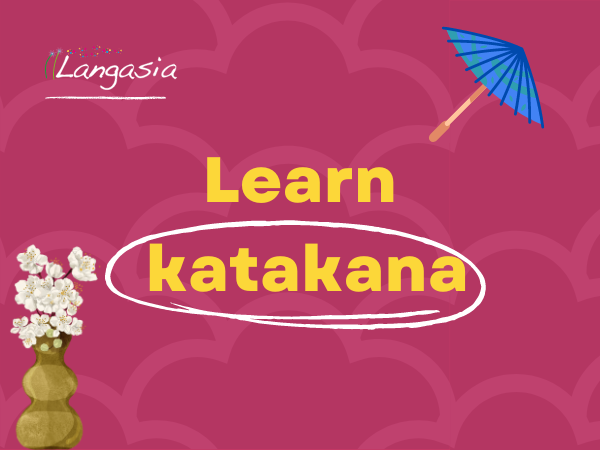
Learn Katakana
3 modules
✽
Lessons
Let's move on to the second part of Japanese writing, the katakana. In this course we will learn the 46 katakana as well as the variations and combinations. You will...
Course curriculum
1/ カタカナ The 46 basic katakana
10 Lessons
Now that you know hiragana well, it's time to move on to katakana, just like hiragana they are important to learn. There are also 46 in all, let's see them all through these lessons.
2/ カタカナ Variations of sounds
5 Lessons
Now that you know all the katakana, let's see the sound variations. By adding a small symbol at the top right, the sound changes as for hiragana. We go through all of this in detail, learning each variation. Let's go.
3/ カタカナ Combinations
11 Lessons
Last straight line in learning katakana with combinations. Let's see the katakana combinations giving different pronunciation. You will see that here too it is the same as with hiragana. In each lesson, find a series of katakana combinations, learn to read them, pronounce them, write them and memorize them all.


 Japanese
Japanese
 Korean
Korean






